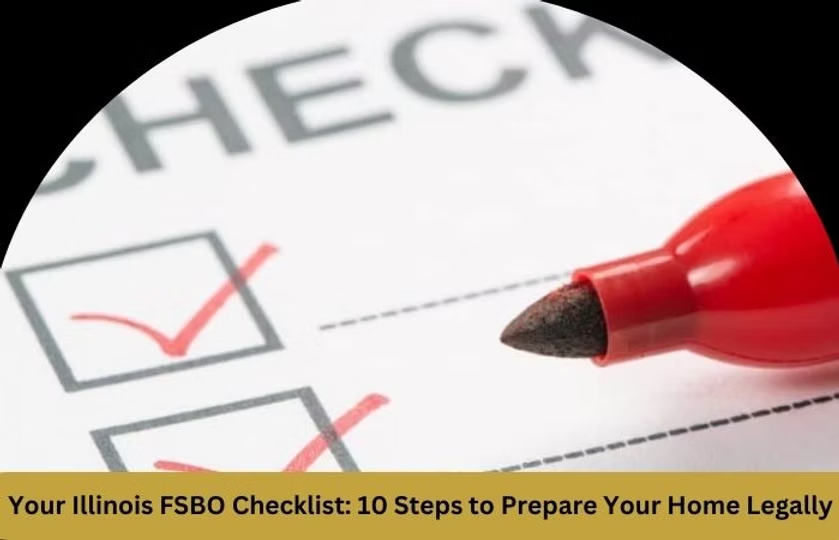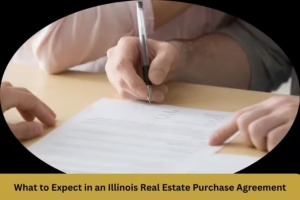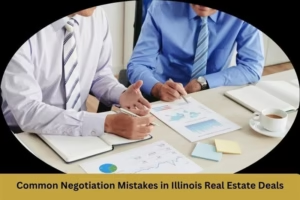Selling your home without a real estate agent-commonly known as FSBO (For Sale By Owner)-can be empowering and financially rewarding. But in Illinois, as in most states, skipping the agent doesn’t mean skipping the legal responsibilities. In fact, you now bear the full burden of legal compliance, documentation, and due diligence.
To help you navigate the legal landscape with confidence, The Real Estate Law Firm has created this comprehensive FSBO checklist. Below are 10 critical steps every Illinois homeowner must take to prepare their property for a legally sound sale.
Start your FSBO journey with expert legal guidance.
1. Confirm Ownership and Resolve Title Issues.
Before listing your home, confirm that the title is clear and in your name. If there are any liens, unpaid taxes, or boundary disputes, they must be resolved. Request a preliminary title report or title search.
Tip: Work with The Real Estate Law Firm to uncover and correct title defects early, avoiding costly delays later in the process.
2. Order a Property Survey (If Needed).
Although not mandatory for all sales, a property survey helps establish clear property boundaries and can be essential for buyers or lenders. It may also resolve future disputes about fences, driveways, or easements.
3. Prepare and Complete the Illinois Disclosure Forms.
Illinois law requires sellers to provide a Residential Real Property Disclosure Report. This form must be filled out honestly and thoroughly, disclosing known material defects such as roof leaks, plumbing issues, or foundation problems.
Failure to disclose known issues could result in legal liability-even after the sale is completed.
The Real Estate Law Firm can guide you through this disclosure process to ensure your compliance and reduce risk.
Ensure proper disclosures with our FSBO legal team.
4. Provide a Lead-Based Paint Disclosure (For Older Homes).
If your home was built before 1978, federal law requires you to disclose any knowledge of lead-based paint and provide buyers with an EPA-approved pamphlet.
This form is non-negotiable and must be signed by both parties.
5. Set the Right Price With a Comparative Market Analysis (CMA).
You’ll need to price your home competitively. While this isn’t a legal step, it’s a smart one. You can hire a licensed appraiser or use public data to perform a CMA.
Pricing too high can scare off buyers; pricing too low leaves money on the table.
6. Draft a Legally Binding Purchase Agreement.
Once you receive an offer, a purchase agreement must be drafted. This document outlines terms such as price, contingencies, financing details, and closing timelines.
Generic templates won’t always reflect Illinois-specific legal requirements.
The Real Estate Law Firm specializes in drafting customized, legally sound FSBO purchase agreements for Illinois sellers-ensuring you’re protected throughout the transaction.
7. Hire a Real Estate Attorney (Highly Recommended in Illinois).
Illinois is one of the few states where real estate attorneys are commonly involved in residential transactions. In fact, many buyers will have legal representation.
As a seller, you’ll want your own attorney to:.
Review and prepare legal documents.
Conduct negotiations.
Handle title and escrow coordination.
Facilitate the closing.
The Real Estate Law Firm offers affordable flat-fee FSBO legal services tailored to Illinois property owners.
8. Open Escrow and Order Title Insurance.
Once a contract is signed, you’ll need to open an escrow account (usually through a title company or attorney’s office). Funds and documents will be held here until the deal closes.
The buyer may request owner’s title insurance, which protects against unknown title issues. You, the seller, typically pay for this in Illinois.
9. Coordinate Inspection and Appraisal Access.
Most buyers will request a professional home inspection. If the sale involves a mortgage, their lender will also order an appraisal.
Be responsive and flexible in scheduling these visits-delays can cause buyer anxiety and slow the deal.
10. Prepare for a Legally Compliant Closing.
The closing process involves signing the deed, delivering documents, transferring keys, and handling financial transactions.
Your attorney (ideally from The Real Estate Law Firm) will:.
Prepare the deed and settlement statement.
Ensure payoff of any mortgage or liens.
Confirm legal compliance.
Oversee the closing.
Once funds are disbursed and documents are recorded, your sale is complete-and legally clean.
Final Thoughts.
Going FSBO in Illinois can be a great way to save on commission costs, but skipping professional guidance can result in legal pitfalls. You don’t need a realtor, but you do need the right legal support. That’s where The Real Estate Law Firm comes in.
We specialize in helping FSBO sellers like you handle everything legally, efficiently, and confidently-from the initial listing to final closing.
Contact us now to handle your FSBO sale right.
FAQs:.
1. Do I really need an attorney to sell my house FSBO in Illinois?
While not legally required, most FSBO sellers in Illinois hire an attorney to draft contracts, handle legal filings, and oversee closing. It’s highly recommended.
2. What disclosures are legally required in Illinois?
Sellers must provide the Residential Real Property Disclosure Report and, for homes built before 1978, the Lead-Based Paint Disclosure.
3. Can I use a standard purchase agreement from the internet?
It’s risky. Standard forms often omit Illinois-specific legal requirements. Use a custom agreement drafted by The Real Estate Law Firm.
4. What happens if I fail to disclose a problem with my home?
You could face lawsuits and be required to compensate the buyer-even after the sale closes.
5. Who pays for the title insurance in Illinois?
Sellers typically pay for owner’s title insurance, though terms can be negotiated.
6. Is an appraisal necessary for a FSBO sale?
If the buyer is using a mortgage, their lender will require an appraisal. Cash buyers may waive it.
7. What is escrow, and who handles it?
Escrow is a neutral holding of funds and documents. It’s usually managed by a title company or attorney.
8. Can I negotiate directly with buyers?
Yes. FSBO sellers handle their own negotiations, though your attorney can assist with offer reviews and counteroffers.
9. What are the typical closing costs for FSBO sellers in Illinois?
Expect to pay for attorney fees, title insurance, deed preparation, and any agreed-upon repairs or concessions.
10. How can The Real Estate Law Firm help with my FSBO sale?
We offer tailored legal services including contract drafting, title reviews, disclosure compliance, and full closing support for FSBO sellers across Illinois.




